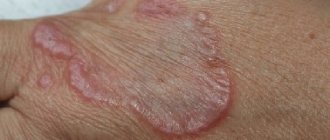Vulvitis is irritation or inflammation of the vulva, the skin just outside the vagina. This can be caused by dryness, abrasion of the skin, allergies, infection or injury. Typically, vulvitis in women is not a serious condition, although it can cause persistent discomfort or pain. Vulvitis is quite common and usually resolves without complications. Lifestyle adjustments are usually effective unless they are caused by an infection, genital problem, or medication. Be sure to listen to your body and don't ignore vulvar itching, odor, or discomfort. This type of vulvitis usually does not go away on its own.
Sometimes vulvitis is a symptom of an underlying condition that requires treatment, such as a sexually transmitted infection or fungal infection. If you have persistent irritation for several days, you should see a doctor. Treatment depends on the cause of your condition.
Description
Vulvovaginitis and vulvitis are a group of inflammatory diseases of various etiologies. They are localized in the lower genital tract, which includes the vulva and vagina. The inflammatory process can be primarily non-infectious and also infectious (specific or non-specific).
The mucous membrane of the vagina and external genitalia is affected. Clinical manifestations of vulvovaginitis and vulvitis include redness, swelling, itching, and burning in the genital tract. The nature of vaginal discharge is determined by the type of pathogen.
Possible complications and danger of the disease
Untimely or improper treatment of vulvitis/vulvovaginitis can cause the disease to become chronic. It is characterized by periodic exacerbations, difficulty in therapy, and hypertrophy of the sebaceous glands may occur. Girls may experience synechiae, which sometimes requires surgical intervention.
Vulvovaginitis can cause diseases of the urinary system, cervix, pelvic organs - adnexitis, endometritis, etc., as well as associated infertility.
Causes
The leading cause of the development of pathology in the genital tract is considered to be inflammation, which is caused by various infectious agents. It is customary to distinguish nonspecific and specific pathogenic flora that cause an inflammatory process. Nonspecific pathogens include:
- enterococcus;
- coli;
- staphylococcus;
- diplococcus;
- chlamydia;
- anaerobes;
- candida;
- another bacterial infection.
Specific inflammatory processes are caused by pathogens of gonorrhea, mycoplasmosis, ureaplasmosis, trichomoniasis, genital herpes, cytomegalovirus infection and other STDs. Damage to the mucous membrane of the external genitalia is possible with extrapulmonary tuberculosis and diphtheria.
These diseases are also non-infectious in nature at their onset. Their occurrence is caused by the presence of helminthic infestations in the body, endocrine and metabolic disorders, allergic processes, insufficient hygiene, decreased immunity, and prolonged and uncontrolled use of antibiotics.
In postmenopause, vulvovaginitis occurs against the background of atrophic processes and a decrease in the activity of tissue protective mechanisms. Inflammation often develops after injury to the genital mucosa.
Classification
Based on the clinical and etiological principle of the development of diseases, two types of vulvovaginitis are distinguished:
- primary non-infectious,
- primary infectious.
Primary non-infectious vulvovaginitis is characterized by traumatic, allergic, parasitic, dyshormonal, dysmetabolic origin and occurs with specific secretions.
According to etiology, infectious diseases are:
- nonspecific,
- specific.
They are classified according to age criteria:
- vulvovaginitis in girls,
- women of childbearing age,
- postmenopausal women.
According to the duration of the flow, the following are distinguished:
- acute (up to one month),
- subacute (up to three months),
- chronic (more than three months).
According to the nature of the course, vulvovaginitis is:
- persistent,
- recurrent.
Symptoms
The clinical manifestations of most vulvavaginitis are similar despite different etiologies. Inflammation in the genital area is manifested by the following symptoms:
- burning;
- pain;
- itching
These symptoms intensify during urination, sexual intercourse, and walking. Examination of the vulva reveals swelling and hyperemia. On the skin in the perineal area, scratching, redness, and maceration of the skin are found. In severe forms of inflammation, erosions form on the genital mucosa. Against this background, patients develop neuroses and sleep disturbances.
Discharge from the genital tract during acute inflammation can be scanty or abundant. By their nature they are divided into: watery, curdled, serous-purulent, purulent, bloody. It depends on the pathogen. The discharge often has an unpleasant odor.
General infectious symptoms (fever, enlarged lymph nodes) occur infrequently. If the disease is chronic, the infection often spreads upward. With a long course of the disease, synechiae may appear. They make it difficult to urinate, have sex, and prevent pregnancy.
Prevention of vulvitis
Prevention of vulvitis includes the following principles:
- compliance with the rules of personal, intimate and sexual hygiene;
- casual sexual intercourse should be avoided;
- it is necessary to treat all diseases in a timely manner, regularly visit a gynecologist for preventive examinations;
- You should not use cosmetics and hygiene products with a strong odor; give preference to hypoallergenic products that have been clinically tested;
- wear underwear made of natural fabric;
- make choices in favor of a healthy lifestyle and nutrition.
Diagnostics
When making this diagnosis, the doctor relies on examination data, laboratory and instrumental diagnostic data. When examining a patient on a gynecological chair, a gynecologist reveals swelling, hyperemia of the vulva and perineum. He prescribes the following additional studies:
- smear microscopy;
- general urine analysis;
- PCR analysis;
- colposcopy;
- cervicoscopy;
- fluorescent antibody method;
- Ultrasound of the pelvis;
- scraping for enterobiasis.
According to indications, the patient is sent for consultations with specialists.
Contraindications
There are several contraindications for the disease, and most of them relate to restrictions on the use of certain foods. In case of vulvovaginitis, it is strictly prohibited:
- consumption of alcoholic beverages, fatty, salty, spicy, smoked and sweet foods, foods with any food additives;
- Fast food, semi-finished products, instant food are prohibited;
- If you have an allergic predisposition, you should exclude foods that provoke allergy attacks.
Treatment
Etiotropic drugs are used to treat the disease. Local treatment of the genital mucosa is carried out with antiseptics and disinfectant solutions. Eliminate provoking factors and treat concomitant diseases. Then the normal vaginal microflora is restored.
Etiotropic therapy includes drugs that act on the pathogen. Local (vaginal suppositories, creams) and systemic medications are used. They are prescribed taking into account the sensitivity of pathogenic flora.
Prescribe complex local ointments and creams that have antibacterial, antimycotic, and antiprotozoal effects. For genital candidiasis, antifungal drugs are used. After antimicrobial treatment, normal microflora is restored. For this purpose, probiotics are prescribed intravaginally.
To relieve itching and inflammation, douching is done with decoctions of medicinal herbs, as well as antiseptics. For secondary vulvovaginitis, antiallergic drugs are recommended. In case of diabetes mellitus, the glycemic level is adjusted. Infectious foci are sanitized. For atrophic disorders, HRT is prescribed.
In case of enterobiasis, deworming is carried out. If a specific pathogen is identified, the sexual partner is treated. Patients are advised to make dietary adjustments. It is important to carefully adhere to hygiene rules for caring for the external genitalia.
Atrophic vulvitis during menopause
Lack of estrogen can lead to irritation, dry skin and mucous membranes. This is exactly what happens to the vulva during menopause. To treat atrophic vulvitis, local estrogen preparations and hormone replacement therapy are used.
Uncontrolled use of antibiotics and corticosteroids causes candidiasis of the vagina and vulva. You should strictly follow the doctor’s instructions and not self-medicate. If you experience side effects of treatment or allergies to medications, consult your doctor immediately.
Cost of initial appointment
The cost of treatment for vulvovaginitis at JSC Meditsina (Moscow) is presented in the table below. Please note that prices are listed by category to make it easier to find the service you need. The price of the primary appointment differs from the secondary one. From the table below, you will learn about prices for consultations, examinations, and medical procedures for both adults and children. If you have any questions, you can call our help desk and find out the prices for treatment or the cost of the examinations you need.
The main causes of inflammation of the external genitalia and vagina in children
Inflammation can occur for many reasons, the most common cause of vulvovaginitis is:
- Allergic reaction. The cause of the pathology is the abuse of certain foods (strong allergens are chocolate, citrus fruits, foods high in dyes, honey). Allergies can also be caused by medications, household chemicals, and synthetic underwear.
- Long-term treatment with antibiotics. It is no secret that antibiotics destroy not only pathogenic bacteria, but also beneficial microflora, which “populate” the vagina in large quantities. In this case, it is important, along with antibiotics, to take drugs to restore the microflora.
- Visiting public or private baths, saunas, swimming pools, swimming in polluted bodies of water. This is the most common cause of infection in young children. In addition, the child may be allergic to chlorine, which is used to disinfect pool water.
- Foreign body in the vagina. In learning about their bodies, babies often try to insert small objects into natural openings - the nose, ears, mouth and, sometimes, the vagina.
- Viral and infectious diseases. Vulvovaginitis can appear against the background of acute respiratory viral infections, influenza, measles, rubella, chicken pox and other diseases. In this case, specific treatment is not required; the disease that caused the pathology is treated.
- Worm infestation.
- General decrease in immunity and endocrine disorders.
An important role is played by the features of the anatomical and morphological structure of the vagina in pre-pubertal girls - the neutral environment of the vagina, the thinness of the mucous membrane, the proximity of the anus to the entrance to the vagina, which also contributes to the development of inflammation.
Advantages of treatment at the clinic of JSC "Medicine"
JSC "Medicine" is a modern multidisciplinary medical institution that provides a full range of medical services in accordance with the highest international standards. We offer emergency medical care, service in a clinic, a comfortable hospital, high-precision laboratory and instrumental diagnostics, and an ultra-modern Sofia Oncology Center.
The clinic of JSC "Medicine" uses the latest achievements in global healthcare. Among our advantages are the following:
- We are pleased to offer our patients a full range of medical services. We employ more than 300 specialists from 67 medical specialties. Our clinic provides a full range of medical services in various medical areas. There are 69 of them in total.
- We operate on the principle of continuity of stages of medical care: a physician-supervisor treats a patient as a family doctor, internist or pediatrician, coordinates treatment prescribed by specialists, and also participates in the treatment of his patients in a hospital.
- We work according to the best Russian and international standards. JSC "Medicine" is the first Russian medical center that is accredited according to the most reliable international standards for the quality of medical care, Joint Commission International.
- We provide guarantees of the quality of medical care. The Medicine Clinic is responsible for the quality of the services provided. If the complaint is justified, compensation may be paid.
- The best specialists work with us. We are proud of our doctors. Patients are advised by academicians of the Russian Academy of Sciences, professors, and famous foreign specialists. JSC Meditsina has developed a system for training doctors and exchanging experience with the most prestigious clinics in the world. Many areas of the clinic, including the sleep laboratory, traumatology and orthopedics center, chemotherapy and radiation therapy departments, were created in collaboration with foreign colleagues.
- JSC "Medicine" is a multidisciplinary university clinic. At our clinical and educational laboratory bases, scientific and clinical developments are carried out in many medical areas. We are advised by academicians and corresponding members of the Russian Academy of Sciences, professors and leading experts in various fields of medicine. The educational and laboratory base of the department is located in the building of the Medicine clinic.
- Exchange of experience with the best medical centers in the world, accredited by JCI, advanced training of doctors and partnerships with leading medical institutions in the USA, Europe and Israel put the Medicina clinic in a leading position. You can learn about our doctors, their work experience, education and experience on the resource of our medical center.
- We use an advanced IT infrastructure, using an electronic medical record (EHR) of our own design with a system for checking drug prescriptions. We have implemented digital archive solutions that allow storing the results of medical research obtained from various medical equipment (computer tomograph, MRI, X-ray machines, ultrasound equipment, endoscopic equipment). JSC Meditsina implemented a smart clinic project, which took into account high requirements for reliability, safety and fault tolerance.
For the convenience of our patients and their relatives, we have created a convenient client-oriented service. Making an appointment with a doctor and viewing your medical data is possible through a mobile application, a personal account on the website, or a Telegram bot. Test results come to hand on disk if you need to get a “second opinion” from specialists at other clinics. With the consent of hospital patients, their relatives can receive SMS notifications about the stages of surgical intervention and observe the hospital and ward online, making sure of the unsurpassed quality of the treatment methods provided in our clinic.









